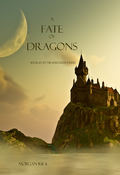
Морган Райс
Realm of Dragons
CHAPTER TWENTY FIVE
Training with the Knights of the Spur was one of the hardest things Erin had done. Her blade crashed against the shield of her current opponent, a knight named Persh, and he bludgeoned into her with his shoulder. She barely twisted aside from the blow, coming up with her spear ready for the next attack.
That was when Commander Harr hit her from the side, striking her with the flat of his sword. Erin wheeled toward him, anger rising, but he was already sheathing it.
“I don’t need to worry about attacks from someone who has already died,” he said.
“But that wasn’t—”
“If you say ‘fair’ I’ll have you run laps of the walls,” the commander warned.
Erin almost said it anyway, just for the sake of the defiance. Somehow though she reined in the urge. She took the cover for her spear, ready to make it a staff once more.
“So I’m supposed to watch out for random old men attacking me,” she shot back at him. A part of her was hoping to goad him, just to have the chance to fight with him again. He hadn’t sparred with her since she’d arrived, and he was clearly the best of them. It was… frustrating.
Commander Harr didn’t rise to the barbs in her words. Instead, he considered her levelly.
“You should be aware that I have sent a message to your father, explaining that you are here.”
“But…” Erin didn’t know what to say to that. She should have seen it coming; these were her father’s knights, after all.
“I have also explained that you have passed our test, and are therefore here to train with us,” the commander said. “Frankly, if you wish to stay, you will need to do far better.”
“How am I supposed to do better?” Erin demanded.
“Your sword masters have obviously taught you well, but here in the Spur we do not train to fight duels. We train for battle, where anything is fair.”
“Like this?” Erin asked, and lunged at the commander. For a moment, she thought that her lunge was fast enough to get through, but Commander Harr twisted aside, letting the blow scrape from his armor. He pushed her, sending Erin stumbling.
“A nice attempt,” he said, “but you’re still ignoring the obvious. Skill will get you some of the way, but power matters, armor matters, surprise matters. There are a thousand things that go into a real fight, and it doesn’t matter if it is fair that you have them or not. All that matters is if you’re the one left at the end of it.”
“And how am I supposed to be the one with the most size and power?” Erin asked. It seemed like the commander’s way of making her feel that she wasn’t wanted. Maybe he was trying to convince her that she wasn’t meant to be here, that she was supposed to go home and be the princess her parents wanted.
“You’re not supposed to,” Commander Harr said. “You’re supposed to find your own edge. Each of our knights has something they do that is unique. Be faster than the other person, be sneakier, outthink your foes. Oh, and never assume that a battle is done until your foe is down.”
Erin saw the blur of movement from the corner of her eye and brought the haft of her spear up in time to parry Persh’s blow. She stepped to the side and struck back, kicking his feet from under him and then bringing her short spear down to rest an inch from his throat.
“Better,” Commander Harr said. “But the only way you will truly learn is to be in the world. Two of my men are about to ride a patrol. Ride with them, listen, and learn.”
“Truly?” Erin asked. She could think of nothing she wanted more. Her father would never have let her ride out into danger, yet the commander was actively sending her. Joy flared in her at the thought.
“Til and Fenir will be by the gate by now,” Commander Harr said. “You’ll need to hurry to catch them. Your horse is saddled. Tell them I sent you.”
“I will,” Erin said, turning to run down there. At the last minute, she remembered to turn and salute him. “Thank you!”
She ran to the spot where her horse was waiting, held by a groom. Erin all but leapt into the saddle, riding to the spot where two knights in half plate were waiting atop their chargers. In her chain shirt and leathers, Erin felt surprisingly vulnerable by comparison.
“The commander says that I’m to patrol with you,” she said, enjoying how easy it felt to say those words. She felt as though she belonged here in a way that she didn’t anywhere else.
“As you say,” one of the knights said. “I’m Til. This is Fenir. He doesn’t say much.”
The other knight nodded in her direction.
“We’re to set off along the East Road,” Til said. “There are reports of folk going missing out near a cluster of old crofters’ huts there.”
“Then let’s go,” Erin said. “I’m ready.”
Ready? She was practically bursting with the need to do this. She’d been hoping for something like this all her life, and now… now she had a chance to prove herself.
***
“Is it always so boring on patrol?” Erin asked. How long had they been riding now? Hours at least, with nothing to show for it except the ache that came from too long in the saddle.
“Seeing nothing is good,” Til said. “It means everything’s as it should be.”
Beside him, Fenir grunted his agreement.
They rode along a path across open ground, between fields as empty as they were beautiful. It was the kind of place Erin was sure Nerra would have liked, and for a brief moment, she missed her sister, but she knew she had to be here, doing this. Their father would never take her seriously otherwise.
They kept riding, and ahead, Erin saw a village, barely more than a hamlet, really, with people wandering the streets. There were scarecrows out in the fields beyond it, although they were poor at their job, because crows were landing on them, pecking on flesh that…
Erin almost gagged as she realized the truth: that those were people who had been tied outside there, their throats cut, their bodies left as some kind of cruel display. She looked around and saw that both Til and Fenir had come to a halt, staring out at the village.
“What’s happening here?” Erin asked.
“Hard to say,” Til replied. “Except that those aren’t villagers in that hamlet.”
“Aye,” Fenir said. It was almost the first word Erin had heard from him.
She could feel the fear in her, and the uncertainty. “If not villagers, then who?”
“Quiet,” Fenir said, and for a moment, Erin thought he was giving her an instruction.
But Til nodded. “The quiet men would be about right.”
“Quiet men?” Erin had heard of them. Her brother Vars had tried to tell her stories of them, only stopping when it became obvious to him that he wasn’t going to get her to scream in fear by doing it. “What are southerners doing here?”
“Hard to say,” Til said. He looked around, then nodded to one of the scarecrows. “We need to leave, before we end up like them.”
“Leave?” Erin demanded. She could hardly believe her ears. She could feel her anger rising, pushing down her fear the same way it had with the bandits. “Leave them to get away with what they’ve done?”
“We need to go and report this to the commander,” Til said. “We don’t know how many there are, or how they’re armed. It’s too dangerous to go into that village.”
“We’re supposed to be knights!” Erin insisted.
“And a part of that is knowing to follow orders,” Til shot back. “Our job on patrol is to deal with minor threats and report the rest back. We need to do it now, too. Do you think they aren’t watching us? That they wouldn’t bring us down if we were in bow range?”
Erin knew that everything the knight was suggesting was sensible. It was probably even the right thing to do, but right then, staring at the scarecrows they’d made of men and women, she knew she couldn’t just turn around and walk away. She couldn’t do it, any more than she’d been able to walk away when she heard about the bandits who had attacked the villagers before. She was supposed to be royal, and if that didn’t mean she was there to protect people, what did it mean?
“Fenir,” Til said. “You head back to the Spur with the princess. Bring back at least a dozen. I’ll sit and keep watch.”
Fenir nodded in response, as if it were the most obvious thing to do.
“You’re going to sit here?” Erin said. “You’re going to wait? For all we know, they might be about to leave.”
“What else would you have me do?” Til demanded, his voice booming from inside his helm.
Erin could still feel the fear pulsing up inside her, urging her to turn back, urging her to do what the knights suggested. She ignored it, gripping her spear tighter. This wasn’t the time to give in to fear, or doubt, or caution. She would be the warrior that she knew she was, not a scared little girl, and not a princess.
“I’d have you do this,” she said, and heeled her horse forward, heading for the village, whatever the danger it held.
CHAPTER TWENTY SIX
Greave had never met anyone like Aurelle before. She led him down through the castle, into the spaces where the long period of feasting and celebration for the wedding was ongoing. These were spaces open to anyone who wished to come, letting in ordinary folk as easily as nobles to celebrate Lenore’s upcoming wedding. Greave tensed as they entered the main feasting hall, then felt Aurelle’s touch there, gentle on his arm.
“Is everything all right, my prince?” she asked.
“I normally avoid so many people,” he said. “They stare at me as if they know everything that is wrong with me.”
Aurelle laughed as though he had made a joke, even though he hadn’t. “They look at you because you are the most beautiful man here.”
Greave flinched again at that, because his brothers, and even his father, had used his looks like a weapon against him. Vars and Rodry had always said he looked too girlish, while his father … he looked too much like his mother for his father’s liking.
“It is not how I feel,” Greave said.
Aurelle turned to him. “Greave, I promise you that I find you the handsomest man in this room, and you are more than that, as well. From what I hear, you are learned, and thoughtful, and kind.”
Greave didn’t know how to answer that. He strove to be all of those things, because he could not bring himself to add to the cruelty or stupidity of the world. With Aurelle’s touch on his arm, for a brief moment he felt as though he actually was the things she thought of him.
“Now,” Aurelle said, “have you seen the entertainments yet?”
“I’ve made notes on some of the lutenists’ techniques, and listened to the playwrights run through their—”
“No,” Aurelle said, “that’s not what I mean. Have you been there, been a part of it?”
Greave shook his head. He hadn’t wanted to stand there in the middle of a crowd, the only one who still felt alone. He’d also guessed what his father would say if he showed too much of an interest in the players. He would have dismissed it as frivolity or unmanly, or both.
“I have always been more at the sides,” Greave said.
“Not today,” Aurelle declared. Her touch on his arm turned into a grip on his wrist, pulling him forward into the crowds of people there. Many of them turned to him and bowed. Some even smiled, and that wasn’t something that Greave was used to.
She led the way to a table filled with the lightest of pastries and the finest of wine. She held out a pastry to Greave, and he realized as she did it that he was expected to bite down on it. He did so, because the alternative seemed to be getting it smeared on his face. He swallowed, and was about to complain about the indignity of it when the taste hit him. It was bright, sharp, and sweet, and for once, Greave didn’t feel as though the food was about to turn to ash in his mouth.
“That’s…” Greave didn’t know what to say. “Amazing.”
“You have been denying yourself too many pleasures,” Aurelle guessed. “Or perhaps you just haven’t had someone to really appreciate them with you.”
She passed him wine, and Greave sipped it delicately. He wasn’t going to quaff it the way Vars might, wasn’t going to turn into something as debauched as him. Yet maybe, just maybe, there was a middle ground. Didn’t the philosopher van Greten write, “We can enjoy the world in moderation, without it becoming something to be avoided”?
It seemed that Aurelle wasn’t done with him, because she led the way over to a spot where players were putting on a raucous performance, in which it seemed that an explorer of the southern lands was stumbling into more and more laughable circumstances. Currently, a peasant character seemed to be trying to sell him a donkey, trying to convince him that it was a thoroughbred racehorse.
On another day, Greave might have stood there, examining all the ways that the playwright worked at his craft, all the subtle tricks used to make the language flow and the scenes contrast with one another. He would have felt like a man apart, understanding but not truly enjoying any of it.
Here, now, with Aurelle there, he laughed. He actually laughed, at stupid jokes about a man who couldn’t see the truth in front of him.
“And will it jump?” the noble asked the peasant. “I’ve a mind to race it over hedges and fences.”
“Aye, it will get past all those,” the peasant said, and then stage whispered to the audience, “if you get off to open the gates for it.”
Greave laughed along with the rest of them, and glanced over to find Aurelle looking at him with apparent joy at the sight of him like that. She seemed to be taking as much pleasure in his presence as he was in hers, and that seemed almost like a miracle. Greave was about to say how impossible it seemed that someone so perfect should appear in his life so suddenly, but he got no chance to do so, because Aurelle was already glancing in a different direction.
“Do you hear that?” she asked. “They’re starting a dance. Come on.”
She pulled at Greave and he went with her, because he didn’t want to break contact with her, didn’t want to break that slender connection to everything that seemed good, and right, and real. He watched Aurelle as they walked, and she was perfection itself in every movement, so that it was hard to imagine being anywhere but there with her.
Was this what love was like? Greave had no point of comparison except the things that had been written in plays and books. His brothers had always treated him as a kind of failed brother, who didn’t do the things they did. His sisters possibly loved him, but Queen Aethe had always emphasized their separateness and difference to him. His father… no, while his mother’s death had robbed Greave of even that love.
This was different. It was sudden and sharp, like lightning across his body.
“Will you dance with me?” Aurelle asked.
“I don’t dance,” Greave said.
“I find that hard to believe. You must be beauty itself when you move. Please, for me?”
Greave could have countered any other argument. He could have provided a dozen objections to dancing based on everything from the works of sword masters to philosophers, religious writers to poets. But he couldn’t simply say no to Aurelle in this, or anything else.
“I don’t know what I’m supposed to do,” he pointed out.
“That’s all right,” she said. “I’ll show you. Here, you hold me like this.”
She moved close to him, so close that there was no space between the two of them, and Greave felt sure he could feel her heartbeat against his. Or maybe it was his heartbeat, thrumming with the excitement of being there like this.
“Now we move together. Feel the music. Move in time to it,” she said.
Greave did his best, listening to the music not for the technical components of meter and scale for once, but just for the flow of it. He felt himself falling into that flow, and Aurelle’s presence made it easy. He felt as though he could feel every moment she was going to make and respond to it automatically, as if she lent him her grace in some indefinable way.
In the moment when she kissed him, even that felt like the most natural thing in the world to do. Her lips met his, and in that moment, Greave couldn’t work out which of them was leading the kiss, which of them was kissing the other.
“I… haven’t done that before,” Greave breathed when they pulled back from one another.
“You haven’t kissed someone?” Aurelle asked.
Greave shook his head.
“Then you’re a very fast learner,” she said with a smile.
In that moment, there was no doubt left for Greave; he knew he was in love. It made no sense that he should be in love so quickly, but he knew he was.
“It makes me wonder what else I might teach you,” Aurelle said. Her finger hooked into Greave’s shirt, gently drawing him with her.
“Where are we going?” Greave asked.
“To my rooms,” Aurelle said. She hesitated for a moment, looking suddenly as shy as Greave felt. “That is… if you want to?”
That hint of shyness was the thing that clinched it for Greave. It said to him that this was as strange an experience for her as it was for him, and that some part of her felt all the strange, impossible things that were running through him. Greave stared at her, seeing yet another side to her: this vulnerable, gentle need to be loved as much as he needed it. Slowly, carefully, Greave nodded.
“I want that more than anything,” he said.
CHAPTER TWENTY SEVEN
Renard watched Lord Carrick’s castle home the way he might have stared at a musical score, or perhaps at Yselle when she was in one of her more unfathomable moods: looking for understanding, for the chink of light that would show the way in. He stared at it from the fields beyond, dressed in peasant garb so that none would think twice about his presence there, memorizing all he could of the movements of the guards and the hidden spots around the walls.
“Patience,” he told himself, and in truth, this was the one thing in life where he had patience. Tell him to work a farmer’s tasks, and he’d be gone in a day. Leave him to work as a chandler or a merchant’s runner… he’d tried it once, and had lasted a full week before the itch got to him, the pressing, weighty feeling that this wasn’t all there was, that there had to be more. He’d run off with half the man’s takings and drunk most of it the week after to try to forget the sheer boredom of it.
Give him a locked place to look at, though, and he could wait all day. Had been waiting all day, just to make sure that everything he’d gotten from the former guard was right. Renard smiled to himself at that; Lord Carrick should pay his guards better if he didn’t want them betraying him. Apparently, he’d spent enough on locks for his doors to make up for it.
Behind him, his horse whinnied where Renard had left it tied to a tree. It was obviously as impatient as he was, but then, it was a flighty horse. After all, the man he’d stolen it from had sworn it was finest southern thoroughbred.
“Now,” Renard decided as the light started to fail. Changing quickly in a stand of bushes, he threw on darker clothing, complete with a hood to hide his features, and leathers that might at least do something to protect him if this all went wrong. He hurried forward, in the direction of a spot the guard had told him about, and which seemed obvious now that Renard knew it was there.
In that spot, the wall was crumbling slightly with age and disrepair; apparently, Lord Carrick didn’t see the point in spending money on stone when he could spend it on gilt and silver for the inside. That was good, because it meant that a man like Renard could climb without the need to throw a grapnel, trusting to knowing hands and feet to raise him up a little at a time. He would drop a rope on the way back, but for now, it was better not to have the noise.
“No harder than climbing a tree,” Renard tried to tell himself, although in truth, it was plenty harder than that. Even with the handholds, the wall was a thing of nearly sheer stone, and Renard had to press himself to it like a lover, one limb and then the next searching for the way up. He was almost at the top when he heard the sound of approaching footsteps.
He froze in place, willing himself to be just another part of the wall, a shadow as natural as any cast in the evening light. His muscles complained at the effort of hanging there like that, but he ordered them to be quiet. What did they want him to do? Drop off and see if he could fly?
The shadow of a guard passed above, standing there for far too long for Renard’s liking. Every second spent there felt like an agony of immobility, but Renard forced himself to patience until the man passed. Better not to attract attention just yet.
He hopped onto the battlements, quickly took in the locations of the patrolling guards, and smiled to himself. All was exactly as he’d thought it would be. Of course, if he stood there congratulating himself on his genius, they would probably spot him anyway, so it was best to get moving. Now he just had to remember the timing, as perfect as any song. Had he decided that this worked better to “The Seven Lilies” or “Tinker’s Gig”? The notes of “A Harpist’s Lament” came into his head. Ah, that was it…
In time to the rhythm of it, Renard dropped down from the wall, rolled, came up, and sprinted in a burst to the wall of the keep. He paused there, counting the beat, waiting while another set of footsteps passed by. Silent as a shadow, Renard climbed again, looking for the window he wanted.
There was an art to getting through a window without making a sound. Quiet as the growing darkness around him, Renard started to remove pieces of glass, depositing them in a small sack he’d brought to catch them. With the glass gone, it was relatively easy to cut through the lead and bend it back, giving enough room for his muscled form to slide through. It didn’t matter what kind of locks Lord Carrick put on his doors when there was a window to the room. Renard started to take a step forward, then stopped himself just in time as he saw a tripwire set there.
He lit a thief’s lamp, the hood over it providing a small circle of light directed downward so it wouldn’t show beyond the room. He bent, looking along the wire and seeing the crossbow it was connected to. Very, very carefully, he disconnected the wire. Even though he was sure he did it right, he still breathed a sigh of relief when the crossbow didn’t go off.
Renard looked up and his eyes lit up almost as much as the lamp at what he saw in the room. The sailor he’d talked to at the Broken Scale hadn’t been lying about what they’d been carrying. There were chests there that, when opened, gleamed with the shine of gold. There was enough here to last a lifetime, maybe, if he were able to take it all.
“And how would I do that?” he muttered to himself. “Enlist the guards?”
Better to stick with the plan. Taking a bag from his shoulder, Renard opened it, trying to decide what would be the easiest to carry, and to dispose of. Coins, definitely. He knelt by the chests, scooping them into his sack the way a farmer might have gathered potatoes. He kept going, wanting to take as much as he could get away with, because a chance like this only came along once.
That was roughly when everything went wrong.
Renard heard the snick of locks being opened, but there was nowhere to hide in a room this size, and no time to get back out the window. He tied off the end of his sack of stolen coins, but by then, the door was already swinging open.
A pair of guards came in, accompanying a man who might have been a clerk of some kind. The guards took one look at him and reached for their swords, while the clerk opened his mouth and let out a cry that could probably be heard two villages away.
“Thief!”
With no time to run, Renard knew he had to go the other way. He barreled into the first of the guards, smashing him back into the door frame with his shoulder. The second had his sword out by now, but in such close quarters, there was no space to swing the weapon. Renard grabbed the guard’s arm and pinned it back as the man tried to find an angle to swing at him. He knew that at any moment, the second guard might be there at his back, ready to kill him. He did the only thing he could do in that moment: he drew his dagger and thrust up, around the side of the man’s breastplate and into his lungs.
As the guard collapsed, Renard spun just in time to try to block the swing of a sword. He only partly managed it, and felt the blade cutting through the layers of his leathers, wounding the flesh beneath. Renard cut back, slicing across the man’s throat. He paused, trying to make sense of the chaos, and then cursed himself for doing it. You couldn’t make sense of chaos like this; you could only ride it and hope for the best.
He grabbed the sack he’d filled, flung it over his shoulder, and leapt through the window he’d come through. Renard rolled as he landed, but even so, it hurt, the clink of the coins against his ribs knocking the wind out of him. He forced himself to his feet, saw people staring, but he was already running.
A crossbow bolt flashed past him and he ducked instinctively, but what good was ducking when the bolt was already past? He wove as he ran, heading for the patch of wall he’d come over.
“No time,” he told himself. He ran for the castle stables instead. Another bolt flashed past him, but Renard ducked into cover, hiding behind a door, then scuttling low to duck in behind some hay bales. The guard who had fired at him came in, loading a fresh bolt, and the germs of a plan formed in Renard’s mind when no more followed.
“Don’t think,” he reminded himself. “Ride the chaos.”
He waited until the man’s back was turned, lunged up, and wrapped a meaty arm around his throat. Renard squeezed, and kept squeezing until the guard went limp. Then he dragged him back behind the hay and started to change.
The disguise that resulted was a long way from perfect. Renard had the man’s surcoat with Lord Carrick’s insignia, and he had a helm that would disguise some of his features, but they were built too differently for Renard to steal the other man’s armor. He would just have to hope that confidence was enough.
Going through the stable, he selected a mount and saddled it, throwing his ill-gotten gains into the saddle bags. Renard mounted up, trying not to think of all the ways that this could go wrong, then, very deliberately, he rode out into the middle of the castle.
Around it, he could see guards milling about, clearly trying to find him. How long would he have now? Minutes? Seconds? In the voice he normally reserved for quieting rowdy crowds when he played, Renard called out to them.
“Quick, he’s over the wall! We need to get after him! Open the gate!”
For a second, he thought it wouldn’t work. It shouldn’t have worked, because he knew just how flimsy this disguise was, and how stupid it was to open a gate when a thief was inside. Yet it seemed that these men were too afraid of losing part of Lord Carrick’s spoils to think properly, and the gate swung open.
Renard charged through it, bellowing more nonsense about getting after the thief. Men came out with him on foot, but Renard surged forward, outpacing them with what he hoped looked like his eagerness for the chase. He rode for what must have been half a mile before he grabbed the saddlebags and hopped down from the saddle, striking the horse to send it off in a fresh direction in case the guards had worked out his ruse by now.
Renard went the other way, to the spot where he’d left his own horse. He could feel the pain of the sword blow he’d taken, and the ache in his ribs from the fall, but as he mounted up it seemed worth it. He’d done it; he’d actually robbed Lord Carrick. With the sounds of the hunt for him still in the distance, it would be easy to ride clear.
Now, it was just a question of celebrating.







